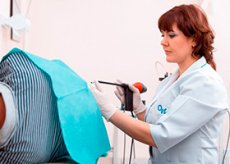Prolapse and prolapse of the rectum
Last reviewed: 23.04.2024

All iLive content is medically reviewed or fact checked to ensure as much factual accuracy as possible.
We have strict sourcing guidelines and only link to reputable media sites, academic research institutions and, whenever possible, medically peer reviewed studies. Note that the numbers in parentheses ([1], [2], etc.) are clickable links to these studies.
If you feel that any of our content is inaccurate, out-of-date, or otherwise questionable, please select it and press Ctrl + Enter.

Prolapse of the rectum is a painless protrusion of the rectum through the anus. Loss - a complete prolapse of the entire wall of the rectum. The diagnosis is established upon examination. Surgical treatment is aimed at correcting prolapse and prolapse of the rectum.
Transient small prolapse only of the rectal mucosa is often observed in quite healthy babies. Prolubation of the mucosa in adults is not allowed on its own and can progress.
Prolapse of the rectum - complete prolapse of the entire rectal wall. The original cause of the fallout is unclear. Most patients are women over 60 years.
Symptoms of prolapse and prolapse of rectum
The main visible symptom is protrusion. It can occur with tension, while walking or standing. In this case, rectal bleeding and stool incontinence can often be observed. The pain is uncharacteristic.
To determine the full extent of prolapse, the doctor should examine the patient in a standing position, squatting and straining. The prolapse of the rectum is differentiated from hemorrhoids by the presence of folds of the mucous membrane. The tone of the anal sphincter is usually reduced. Colonoscopy or irrigoscopy should be performed to exclude another pathology. It is necessary to exclude primary neurologic disorders (eg, tumors of the spinal cord).
What do need to examine?
How to examine?
Treatment of prolapse and prolapse of rectum
In infants and children, conservative treatment of prolapse of the rectum is quite sufficient. The causes of tension should be eliminated. Dense butt reduction of the buttocks between acts of defecation usually contributes to the spontaneous resolution of prolapse. With prolapse only mucous membranes in adults can be performed resection of the mucosa. At abaissement abdominal operation can be demanded. In patients of old age or in weakened patients, an artificial filament or a synthetic loop around the sphincter ring (Tirsch operation) can be performed. Other perineal surgeries can also be considered (eg, Delorme or Altemeier operations).


 [
[